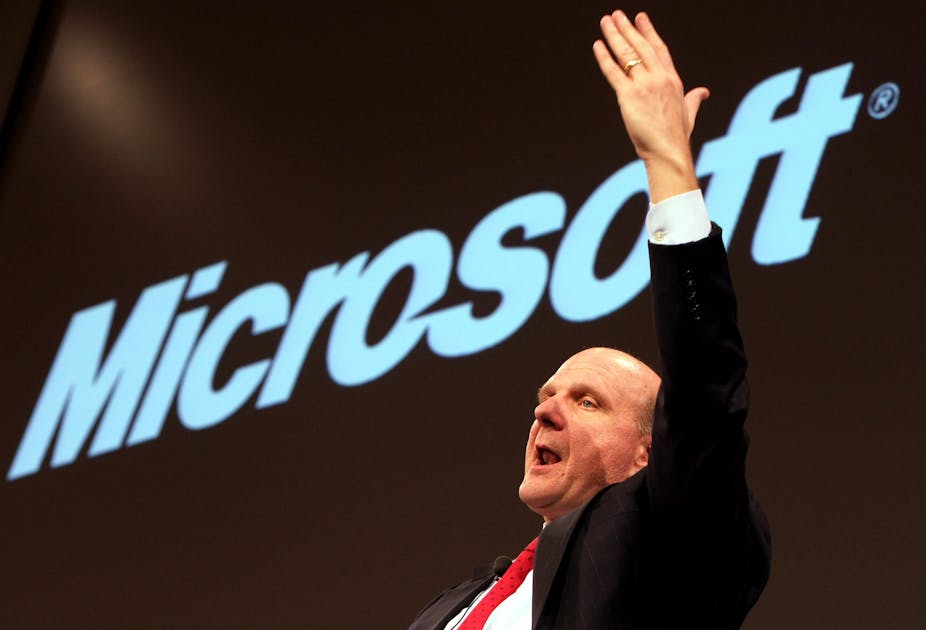How much are you worth to your company? Earlier this week, Steve Ballmer had the misfortune to discover that the announcement of his retirement increased Microsoft’s share price by 7.6%.
Dispiriting as the news must have been, Ballmer probably didn’t reenact the legendary chair-throwing incident of 2005 when he heard. He owns 330 million shares in Microsoft so the boost netted him nearly US$1 billion, despite the blow to his pride.
The late Steve Jobs once declared that when tech giants are led by salespeople, they run into trouble. Ballmer was certainly more sales than tech when he took the helm at Microsoft after Bill Gates in 2000 and the general perception is that his leadership at the company has been hit and miss.
Hit: Office monopoly
Ballmer successfully managed to maintain the dominance of Windows and Office dominance in the corporate world, despite notable disasters such as Windows ME and Vista. Because of the semi-regular upgrade cycle the company offers for these software products, companies could simply skip poorer versions and enter into licensing agreements that ensured Microsoft’s two largest revenue streams continued. As a result, the emergence of alternative products such as LibreOffice and Google Docs have summarily failed to break the virtual monopoly held by Word and Excel over office data.
Hit: XBOX
The days of people queuing for OS updates may be over, but they will stand in line for hours and even days to purchase games consoles and smartphones. Microsoft had struggled in the games console market but acheived popular appeal with the XBOX. Nevertheless, this particular hit has been marred by some serious problems of late. When the next generation of the console was announced recently, gamers balked at the digital rights management restrictions that came with it. The consoles would require users to regularly connect to the internet to confirm their identity, which would limit their ability to share games and effectively shut down the second-hand games market. A major U-turn on these features hastily followed.
Miss: mobile and tablets
Microsoft significantly failed to anticipate the movement to the post-PC device, both in smart phones and tablets. There is a Youtube video of Ballmer rolling his eyes after the launch of Apple’s iPhone, in which he says the device won’t appeal to business customers because “it doesn’t have a keyboard which doesn’t make it a very good email machine”.
This neatly encapsulates Microsoft’s blind spot – Steve Jobs anticipated that the cost of post-PC devices would plummet and targeted consumers who could make their own choices, sidestepping corporates who would have purchasing decisions dictated by a tech guy in the server room. Rather than using phones provided for them, consumers have chosen to buy Apple or Android devices for themselves and then taken them into work demanding to know how to get their corporate email. The consequence of this has been the destruction of Microsoft’s smartphone market share.
Miss: battle for the cloud
Online, Microsoft has followed Amazon and Google into cloud services. Its Bing search engine has gained some ground but this has been achieved primarily by buying Yahoo’s market share and fixing the default search engine in Internet Explorer. The chair-throwing incident hinted at above allegedly came about because Ballmer had become so frustrated with staff leaving to join Google. The war for the cloud has not yet been won by any side but Microsoft certainly has lost a lot of battles.
Hit? Young minds run free
One of the last things that Ballmer has managed to do before leaving is to significantly reorganise Microsoft’s divisions. Young computer scientists are far more likely to think about creating a start-up rather than joining Microsoft’s corporate world, which may lead to problems when the company tries to bring in new young brains to join the collective. It had long been known that the MS management structure did not reward success and even pitted groups working on similar products against each other in a peculiar ratings scheme that penalised those people who came bottom in the rankings. Restructuring could help resolve these chronic problems and may get Microsoft innovating.
What happens next depends on the new CEO. There have been many suggestions that Microsoft should simply sell off the consumer divisions and solely focus on the corporate world. A CEO invested in the corporate view of the bottom line could take this view. If it can find someone who can see the advantages of appealing to both the corporate and consumer world, giving consumers a reason to buy its products, then it may be possible for Ballmer’s shares to maintain their value after his imminent departure.

